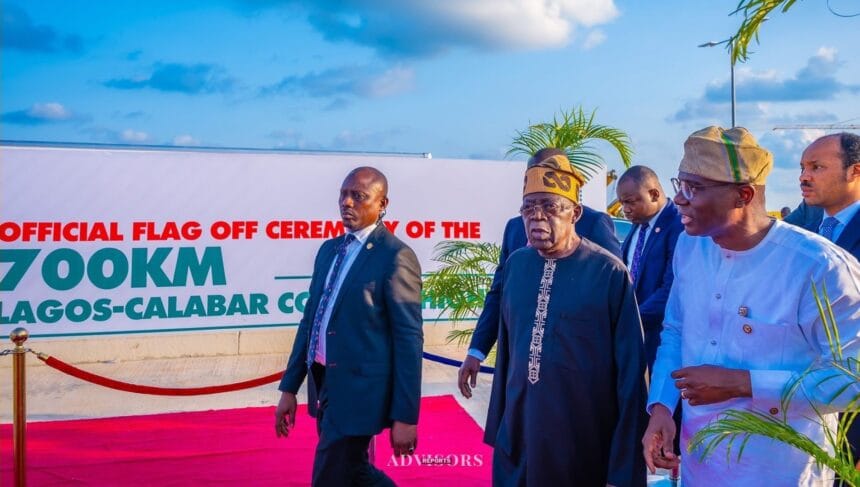… as Nigeria sets to unlock offshore hydrocarbons, gas, solid minerals untapped riches
Oredola Adeola
President Bola Tinubu has revealed that the construction of the 700km Lagos-Calabar Coastal Highway, will complement the United Nations to grant an extension of Nigeria’s continental shelf by an additional 16,300 square kilometres.
Tinubu made this submission on Sunday when he visited the Ahmadu Bello Way, Victoria Island, Lagos, to flag-off the project, being part of activities marking his administration’s first anniversary.
The President stated that Nigeria’s strategic coastal highway project will prevent the Atlantic Ocean from encroaching on critical sections of the country’s coastal shoreline, while also linking the A1, A2, A3, and A4 highway corridors vertically crossing the western, central and eastern regions of the country, north to south.
According to him, the project will also complement the expansion of the country’s maritime industry in the wake of the recent decision by the United Nations to grant Nigeria an extension of its continental shelf by an additional 16,300 square kilometres.
He said, “Today is my day to boast. The deal is done. The dream is realizable. The determination to build a nation of prosperity is possible.
President Tinubu who said, “We must take advantage of these opportunities,” also added that the establishment of more export processing zones along the coastal states must be a priority for the country.
He also noted that the project will ensure that future generations have a good landmark and memory to treasure while serving as a good precedent set for others to follow in the timely provision of world-class infrastructure.
Advisors Reports gathered that in August 2023, the United Nations, through its Convention on the Law of the Sea (UNCLOS) in 2009, granted Nigeria an extension of its continental shelf by an additional 16,300 square kilometres.
The UN Commission on the Limits of the Continental Shelf (CLCS) in August 2023, gave the approval based on Nigeria’s submission to the United Nations, which sought to extend its continental shelf beyond the existing 200 nautical miles.
The extended continental shelf granted Nigeria sovereignty over the additional maritime territory, allowing it to exploit the abundant natural resources believed to be present in the area, such as hydrocarbons, gas, solid minerals, and a variety of sedentary species.
The approval came after detailed studies in geophysics, geology, and geography, coupled with strategic diplomatic efforts.
Two weeks ago, the High-Powered Presidential Committee (HPPC) on Nigeria’s Extended Continental Shelf Project led by Ambassador Hassan Tukur, Chairman of the HPPC, met with the President to submit their report on the progress made in respect of the country’s maritime boundaries and economic potential.
This achievement showcases Nigeria’s commitment to. It also highlights the importance of continuity in government policies and the need for long-term planning in such projects.
Advisors Reports gathered through the submission of the HPPC that Nigeria, after peaceful and strategic expansion of its maritime boundaries without conflict, now has options to either finalize the registration with the UN Secretary-General within a year or acquire additional data for a revised submission, potentially extending the process to four years.




